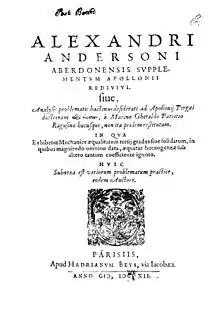Alexander Anderson (mathematician)
Alexander Anderson (c. 1582 in Aberdeen – c. 1620 in Paris) was a Scottish mathematician.

Life
He was born in Aberdeen, possibly in 1582, according to a print which suggests he was aged 35 in 1617.[1] It is unknown where he was educated, but it is likely that he initially studied writing and philosophy (the "belles lettres") in his home city of Aberdeen.[2]
He then went to the continent, and was a professor of mathematics in Paris by the start of the seventeenth century.[2] There he published or edited, between the years 1612 and 1619, various geometric and algebraic tracts.[3] He described himself as having "more wisdom than riches" in the dedication of Vindiciae Archimedis (1616).[1]
He was first cousin of David Anderson of Finshaugh, a celebrated mathematician, and David Anderson's daughter was the mother of mathematician James Gregory.[4]
Work
He was selected by the executors of François Viète to revise and edit Viète's manuscript works. Viète died in 1603, and it is unclear if Anderson knew him, but his eminence was sufficient to attract the attention of the dead man's executors.[5] Anderson corrected and expanded upon Viète's manuscripts, which extended known geometry to the new algebra, which used general symbols to represent quantities.[5]
Publications
The known works of Anderson amount to six thin quarto volumes, and as the last of them was published in 1619, it is probable that the author died soon after that year, but the precise date is unknown.[3] He wrote other works that have since been lost.[6] From his last work it appears he wrote another piece, "A Treatise on the Mensuration of Solids,"[6] and copies of two other works, Ex. Math. and Stereometria Triangulorum Sphæricorum, were in the possession of Sir Alexander Hume until the after the middle of the seventeenth century.[1]
References
- Wikisource:Anderson, Alexander (1582-1619?) (DNB00)
- Chalmers, A. (1812). The General Biographical Dictionary: Containing an Historical and Critical Account of the Lives and Writings of the Most Eminent Persons in Every Nation: Particularly the British and Irish; from the Earliest Accounts to the Present Time. J. Nichols. pp. 175–176.
- Chisholm 1911.
- Brewster, D. (1832). The Edinburgh encyclopædia conducted by David Brewster, with the assistance of gentlemen eminent in science and literature. J. and E. Parker. p. 41.
- Chambers, R. (1841). Lives of illustrious and distinguished Scotsman, forming a complete Scottish biographic dictionary. Blackie and Son. p. 37.
- Chambers, R.; Thomson, T. (1856). A Biographical Dictionary of Eminent Scotsmen, in Four Vols. Blackie. p. 53. Retrieved 3 October 2014.
- "Supplementum Apollonii redivivi". Europeana. Retrieved 15 September 2014.
- Alexandri Andersoni Aitiologia Pro zetetico Apolloniani problematisa se jam pridem edito in supplemento Apollonii redivivi. (Book, 1615) [WorldCat.org]. worldcat.org. 1615. OCLC 310942761. Retrieved 3 October 2014.
- Vindiciae Archimedes. Sive elenchus Cyclometriae novae a Philippo Lansbergio nuper editae. (Book, 1616) [WorldCat.org]. worldcat.org. 1616. OCLC 181880939. Retrieved 3 October 2014.
- Alexandri Andersoni,... Exercitationum mathematicarum decas prima.... (Book, 1619) [WorldCat.org]. worldcat.org. 1853. OCLC 491535931. Retrieved 3 October 2014.
Attribution:
 This article incorporates text from a publication now in the public domain: Chisholm, Hugh, ed. (1911). "Anderson, Alexander". Encyclopædia Britannica. 1 (11th ed.). Cambridge University Press. p. 959.
This article incorporates text from a publication now in the public domain: Chisholm, Hugh, ed. (1911). "Anderson, Alexander". Encyclopædia Britannica. 1 (11th ed.). Cambridge University Press. p. 959.
Further reading
- Chambers, Robert; Thomson, Thomas Napier (1857). . A Biographical Dictionary of Eminent Scotsmen. 1. Glasgow: Blackie and Son. p. 53 – via Wikisource.